Ready or Not: L.A. Sprints to Host the Olympics
The region confronts creaky transit, climbing deficits, climate threats, an openly hostile U.S. president and persistent dangers for its immigrant backbone
By Greg Cornfield June 18, 2025 5:05 am
reprints
Now’s just not a good time.
For sure, Southern California is home to perhaps the nation’s most impressive list of venues — both historic and state of the art — from the Rose Bowl and Memorial Coliseum to the newer multibillion-dollar football stadium and basketball arena in Inglewood. Greater Los Angeles also has more than twice the number of hotel rooms needed to host millions of visitors at once.
But, will L.A. really be ready to host the Olympics in three years?
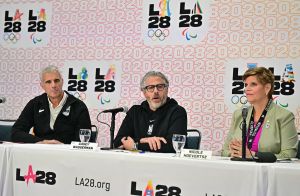
Since securing the bid for the 2028 Summer Games — and setting some particularly ambitious goals and expectations — Los Angeles was hit hard by the global pandemic and resulting effects on the larger economy. L.A.’s flagship industry — film production — seems to hemorrhage more workers and talent by the day; historically devastating fires destroyed or damaged 18,000 homes and structures with estimated costs of up to $131 billion; and, now, an aggressive immigration crackdown is underway.
And L.A.’s long-standing troubles have not gone away. Quite the contrary: California frequently touts being the fourth-largest economy in the world despite being home to one-fourth of the nation’s homeless population. The L.A. region’s public transit system leaves much to be desired for a metropolis that claims to be world-class. And California in general is still believed to be the worst market in the nation when it comes to encouraging development.
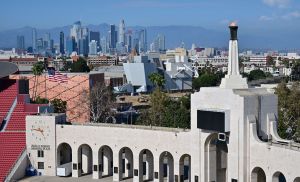
The 2028 Summer Olympics will surely be a generational and defining moment for Los Angeles, but it’s also perhaps the biggest test for the place that considers itself the entertainment capital of the world. With 37 months to go, there is growing uncertainty over whether L.A. can handle what organizers have said will be equivalent to “seven Super Bowls a day for 30 days,” as potentially 10 million to 15 million visitors (and 11,200 Olympians) fill Southern California’s streets.
Unlike the `84 Olympics — which turned a $225 million profit for the city — L.A. taxpayers have skin in the game this time, despite organizers’ claims that it’s a “no-build” Olympics (because no new venues need to be constructed). Despite former Mayor Eric Garcetti’s prediction six years ago that the 2028 Games would result in a $1 billion surplus, the City of L.A. has since pledged to cover the first $270 million of potential cost overruns, and the State of California will cover the next $270 million in overruns. After that, it’s back on the city, which will be responsible for potential overruns of more than $540 million. And that’s with the city facing a $1 billion deficit today.
The organizing committee — named LA28 — has already increased its original budget from $5.3 billion when it secured the bid, to $7.1 billion today, to cover rent for venues and housing for athletes. (And that’s after eliminating previous plans to build a $1 billion Olympic Village, which would have been converted to permanent housing after the Games.)
To that end, LA28 President Casey Wasserman said the committee has obtained commitments of $5.1 billion from benefactors and corporate sponsors, and that he is confident the rest of the $7.1 billion would come from ticket sales, which are estimated to generate $2.5 billion in revenue.

Wasserman separately told the Los Angeles Times last week that taxpayers don’t need to worry. But as the city faces its own deficit, as well as the cost of rebuilding from the wildfires and a softening economy, taxpayer fear is growing. (LA28 did not return several requests for comment for this story.)
Public transportation will be more than vital for the 2028 Games. Los Angeles’ sprawl is very real, and the distance between the more than 40 Olympic venues and locations can be vast. Metro’s Games Route Network “is the heart of the host City and Organizing Committee’s” transportation commitment for the Olympics, spanning 360 miles in four counties (of mostly highways and thousands of buses). And when officials made the bid to secure the Games, they promised a state-of-the-art public transportation system, claiming it would be a “car-free” or “no-car” Olympics, meaning every ticketed spectator would arrive by public transportation or cycling.
To pull it all together, Los Angeles needs to stay in President Donald Trump’s good graces to secure $4 billion in federal funds for transportation, event infrastructure, and security — none of which is not included in LA28’s budget. However, city and state officials spent the beginning of June so far sparring with Trump after federal officials detained hundreds of undocumented immigrants, with some key officials in the White House pushing to significantly increase the number of arrests. The raids have already stunned some of the industries that Los Angeles needs to be functioning at peak capacity for the 2028 Olympics.
The arrests and deportations also spurred protests, leading to Trump’s subsequent decision to send in the National Guard and the Marines. Over the last week, Trump bashed Gov. Gavin Newsom and endorsed his theoretical arrest, and called L.A. “a trash heap” that would have burned to the ground last week if he hadn’t sent in military personnel — all to the detriment to the wider perceptions and reputations of California. So much so that Ohio Sen. Bernie Moreno called for the Olympic Games to be moved from L.A. because recent protests demonstrated the city’s supposed lack of law and order.
That issue came to a head days after Trump nixed $4 billion in federal funding for California’s high-speed rail project, and also after CNN reported the administration is preparing to cancel other federal funding for the state — citing California’s policies on energy, immigration and campus antisemitism. Further, earlier this year, the U.S. Department of Transportation released a memo stating that funding would be prioritized for areas with high marriage and birth rates, and where vaccines were not mandated, which appears to be a veiled rebuke to left-leaning states.
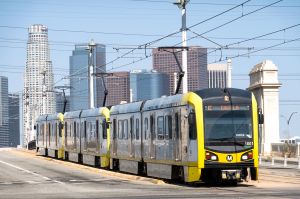
(The state, while facing its own major budget deficit, is also asking for $40 billion from the federal government to help rebuild areas destroyed by the wildfires.)
L.A. Councilwoman Monica Rodriguez told Commercial Observer concerns are absolutely growing about expected federal funding needed for critical infrastructure and transportation — for both the wildfires rebuild and the Olympics — especially in light of the tumultuous relationship between the state and the White House.
“The president and his administration have made quite clear that California is under assault, and there’s no interest in being helpful, even if it means it’s going to undermine reconstruction for a portion of our city, or how we’re being viewed on the national and the international stage,” she said. “I’m very concerned.”
Fellow Council member Adrin Nazarian said California produces 14 percent of the nation’s GDP, and provides the federal government with more than 12 percent of its revenue.
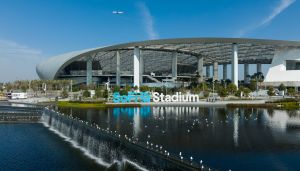
“So whatever damages California damages the whole country,” Nazarian said in a statement sent to CO. “We’ll rebuild the Palisades no matter what the federal government does. We’re moving ahead with the Olympics and the World Cup, but undercutting those efforts will give America a black eye on the world stage.” (L.A. is hosting eight matches for the 2026 World Cup, too.)
Mayor Karen Bass, in an interview with The New York Times, also admitted concerns that the city could become (justifiably) distracted by the wildfires rebuild and that Trump might pull critical funding, and that a federal immigration crackdown could lead to a workforce shortage.
“When you raid Home Depots and workplaces, when you tear parents and children apart, and when you deploy troops to our streets, you’re not trying to keep anyone safe — you’re trying to cause fear and panic,” Bass said in a statement. “These raids must stop.”
Congresswoman Laura Friedman, who is a member of the House Transportation and Infrastructure Committee, said President Trump has shown that he’s willing to jeopardize millions of Californians’ economic stability in order to score political points, even when it comes to critical infrastructure investments.
“The eyes of the world will be on California for the Olympic games, we should be working together to ensure they are a success, not using California as a political pawn,” Friedman said in a statement sent to CO.
Even if the state and federal governments were somehow suddenly cordial about the situation, concerns would still grow that more immigration raids will seriously affect vital industries, from construction to hospitality. But shockwaves have reverberated throughout those industries when the raids started targeting non-criminals, too.
“Targeting people who have not committed crimes will only make housing even more expensive while delaying rebuilding efforts for California wildfire victims and families across the nation,” Friedman added.
Yvonne Wheeler, president of the L.A. County Federation of Labor, said there is already a lot of work to do to prepare for the Olympics under “normal circumstances,” but the escalating detainments and deportations have put the county’s communities in turmoil.
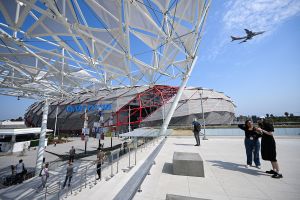
“These actions are causing a ripple effect across key industries — construction, hospitality and transportation — destabilizing the very workforce essential to supporting the Games,” Wheeler said in a statement sent to CO. “We are navigating a critical moment to ensure that these Olympics are supported by a workforce that is safe, valued, and treated with dignity and respect.”
Rodriguez said she believes that Trump’s approach is intended to inflict more fear and strain on the local and state economy.
“You look at our region, immigration is a vital part of food harvesting to where it ends up on your table,” she said. “The immigrant community is a very big contributor to our economy. And [sudden raids are] literally putting businesses in harm’s way.
“It’s not a good time for our local economy, for restaurants, and the building trades to the food industry. It’s all affected by how immigrant populations are being treated.”
Indeed, the region’s homelessness problem is out of control, with more than 70,000 people unhoused in L.A. County, and no hope that it’s going to improve anytime soon or in time for the Olympics. The state and local governments have historically “swept” homeless encampments away ahead of major events as a temporary fix. And the deportation protests are reminding outsiders of the city’s chronic safety issues.
Sonnet Hui, managing director of consultancy Project Management Advisors, said her biggest concern with the city is the homelessness problem.
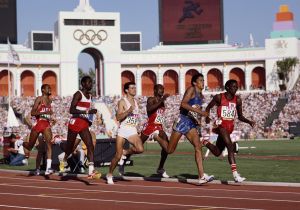
“I think it’s dire. I work downtown. My kid goes to a high school downtown, and every morning I drop him off and there are homeless encampments around the school. It’s just not right,” she said. “The city has so much wealth — L.A. should be able to solve this in a more efficient way.”
In a June 9 interview with radio station KNX, billionaire developer and former mayoral candidate Rick Caruso said the city has been mismanaged and is in a very tough financial situation. He also stressed that public safety is going to be a major issue moving forward and for the Olympics.
“We got ourselves into trouble for no good reason, and now we’ve got to dig our way out of it,” Caruso said. “As part of that [mismanagement], LAPD funding is going to be cut back with the city budget that was approved. … And we shouldn’t be opening the door or look like we need outside help in order to protect our own residents.”
Southern California is also dealing with a years-long affordable housing crisis, exacerbated by the region’s systemic antipathy to multifamily development.
“The city moves at a very, very, very slow pace,” Hui said. “But I think everyone’s getting a little anxious [as the clock ticks on the Olympics]. Like, ‘Hey — we’re not that far away.’”
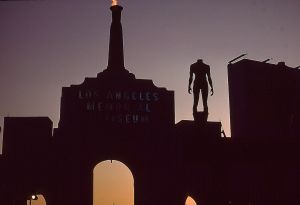
While there are more than enough hotel rooms to go around, hotel owners and the hospitality industry are also at odds over preparation for the Olympics after the city approved a plan to significantly raise hotel worker wages through 2028. The wage hike would increase minimum pay to $30 per hour for many hospitality employees in time for the Olympics, and major hotel groups are quickly working to reverse the wage hike at the ballot box, or they are otherwise cutting plans to expand their hotel portfolios in L.A.
In one example, Sun Hill Properties canceled its planned 18-story expansion of Hilton Universal City following the vote to approve the wage hike. The firm’s CEO cited a lack of confidence in the city’s business climate, predicting job losses, reduced services, and hotel closures due to rising labor costs.
Hui said a third of Project Management Advisors’ portfolio is considered hospitality, and the firm is working with Hilton to upgrade a 1,500-unit hotel near the Anaheim Convention Center for the Olympics.
“On an individual basis, absolutely — people should get paid fairly,” she said. “But I also understand the developer side, and the business side. Change is hard. Everyone wants things to stay the same, but when change happens, people react.”
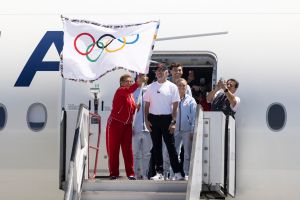
Hopefully for L.A., the massive Convention Center — adjacent to the empty Oceanwide Plaza graffiti tower — is not a harbinger of how the rest of the preparations play out. For years, city officials have planned major billion-dollar updates that have never come to be. After the fires in January, the city almost completely eliminated all expectations that renovations — now pegged at more than $4 billion, including debt costs — would be complete before the Olympics. But the City Council this summer is trying again to complete a portion before the Games.
For their end, the International Olympic Committee is staying positive, and avoiding the messy politics.
“The Olympic Games LA28 have the full support of the president of the United States, the governor of California and the mayor of Los Angeles,” IOC said in a statement to CO. “All of them are being extremely helpful in the preparations for these Games.
“The IOC cannot comment on domestic political situations. The political neutrality of the IOC must be applied. There are three years to go, and we are confident that LA28 will be great Olympic Games.”
Gregory Cornfield can be reached at gcornfield@commercialobserver.com.



